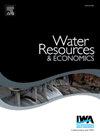Enhancing water efficiency: Distribution efficiency and consumption synergies
IF 1.9
3区 经济学
Q2 ECONOMICS
引用次数: 0
Abstract
The Recast Drinking Water Directive (Dir. (EU) 2020/2184) aims to set a 15 % target limit for urban network losses. Research in this field is crucial for the advancement of EU policy directives aimed towards augmenting water efficiency and conservation in a context of increasing water scarcity. This paper examines the synergies between leakage reduction and water demand policies (water pricing vs. social awareness). In order to estimate the impact of such policies on the achieved water savings, a simple model is presented and applied to the case study of the city of Seville in southern Spain. This case represents an interesting example of continuous efforts towards reducing urban water abstraction in the last three decades. The results offer useful insights into the effectiveness of various policy strategies on the overall water-saving achievements in a context of increasing water scarcity and cyclical drought episodes.
提高用水效率:分配效率和消费协同效应
修订的饮用水指令(署长)。(EU) 2020/2184)旨在为城市网络损失设定15%的目标限制。在日益缺水的情况下,这一领域的研究对于促进旨在提高水效率和节约用水的欧盟政策指令至关重要。本文考察了减少渗漏和水需求政策(水价与社会意识)之间的协同效应。为了估计这些政策对实现节水的影响,提出了一个简单的模型,并将其应用于西班牙南部塞维利亚市的案例研究。这个案例是过去三十年来不断努力减少城市取水的一个有趣的例子。这些结果为在水资源日益短缺和周期性干旱的背景下各种政策战略对总体节水成果的有效性提供了有益的见解。
本文章由计算机程序翻译,如有差异,请以英文原文为准。
求助全文
约1分钟内获得全文
求助全文
来源期刊

Water Resources and Economics
Environmental Science-Water Science and Technology
CiteScore
5.00
自引率
0.00%
发文量
17
审稿时长
51 days
期刊介绍:
Water Resources and Economics is one of a series of specialist titles launched by the highly-regarded Water Research. For the purpose of sustainable water resources management, understanding the multiple connections and feedback mechanisms between water resources and the economy is crucial. Water Resources and Economics addresses the financial and economic dimensions associated with water resources use and governance, across different economic sectors like agriculture, energy, industry, shipping, recreation and urban and rural water supply, at local, regional and transboundary scale.
Topics of interest include (but are not restricted to) the economics of:
Aquatic ecosystem services-
Blue economy-
Climate change and flood risk management-
Climate smart agriculture-
Coastal management-
Droughts and water scarcity-
Environmental flows-
Eutrophication-
Food, water, energy nexus-
Groundwater management-
Hydropower generation-
Hydrological risks and uncertainties-
Marine resources-
Nature-based solutions-
Resource recovery-
River restoration-
Storm water harvesting-
Transboundary water allocation-
Urban water management-
Wastewater treatment-
Watershed management-
Water health risks-
Water pollution-
Water quality management-
Water security-
Water stress-
Water technology innovation.
 求助内容:
求助内容: 应助结果提醒方式:
应助结果提醒方式:


